OTTAWA — Fewer students are coming from abroad to study at Canadian universities this fall, and Universities Canada is warning that the numbers have dropped below the cap the federal government set on international student visas this year.
The immigration minister announced a cap in January as a way to quell the rapid increase in the number of international students, citing pressure on housing, health care and other services.
The new policy limits the number of student visa applications the government would accept into processing, and that was expected to result in a 35 per cent drop in the number of students in 2024 compared to last year.
"The drop just within universities will be well beyond that," said Gabriel Miller, president of Universities Canada.
"This is a hit, a national hit to university budgets that we haven't seen in modern memory."
The cap created uncertainty for prospective students, and the Immigration Department's pause in visa processing while the government implemented the changes may have led those students to look elsewhere, he said.
"The most important piece of feedback we've heard is just real uncertainty and confusion about what kind of opportunities there are going to be to come and study in Canada, and what the rules would be," he said.
Miller said the full impact won't be clear until schools see how many students turn up in September.
There has been an overall decrease in intake and approvals in 2024 compared to the same period in 2023, Immigration, Refugees and Citizenship Canada said in a statement Friday.
The department agrees it's too early to fully assess the impact of the cap on study permit applications, since the busiest months for permit processing are August and September.
In the first half of this year, 244,895 new study permits came into effect, according to data released by the Immigration Department.
That's a 2.6 per cent increase in the number of new student visas compared to the first half of 2023. The number of study permits issued from July 2024 onward is not yet available.
"The full effects of implementing the cap will be more accurately represented in statistics on study permits when we tally the total number of study permits issued for the fall 2024 season, as well as considering those for the winter 2024 season, and once students start to arrive," the department said in a statement Friday,
The temporary cap announced in January is expected to last two years, and is intended to give the federal and provincial governments time to ensure international student programs are sustainable and have integrity.
The government also introduced new limits on work permits for students, their spouses, and postgraduates.
There have been several reports that outline cases of fraud and bad actors taking advantage of students from abroad, in some cases offering a dubious education in return for their higher tuition.
Immigration Minister Marc Miller was not available for an interview on Friday, but in January he admitted that even though they had put a lot of thought into it, the cap was a "blunt" measure by the federal government.
"This is something we need to rein in," he said at the time.
The changes are part of a larger effort to curb the booming number of temporary residents and slow Canada's population growth, but the consequences are potentially massive for universities and colleges. A 2020 report by the Higher Education Strategy Associates found that international student tuition made up 13 per cent of the post-secondary system’s income in 2019, up from just four per cent in 2007.
The federal government's next steps will be of critical importance for Canada's post-secondary institutions, the Universities Canada president said.
"What happens in the next month or two is going to decide whether we start to recover, and the country can continue to compete for the very best and brightest and most talented people our economy needs, or whether we're going to be at a disadvantage for many years to come," he said.
What he hopes for now is that the federal government won't make any more changes that could stall attempts to attract students in the near term.
After that, schools are looking for a better, more finely tuned strategy with responsible targets, "and then work with the provinces and universities to make sure we have the services and the infrastructure and the housing in place for this to work long term."
This report by The Canadian Press was first published Aug. 30, 2024.
Laura Osman, The Canadian Press



